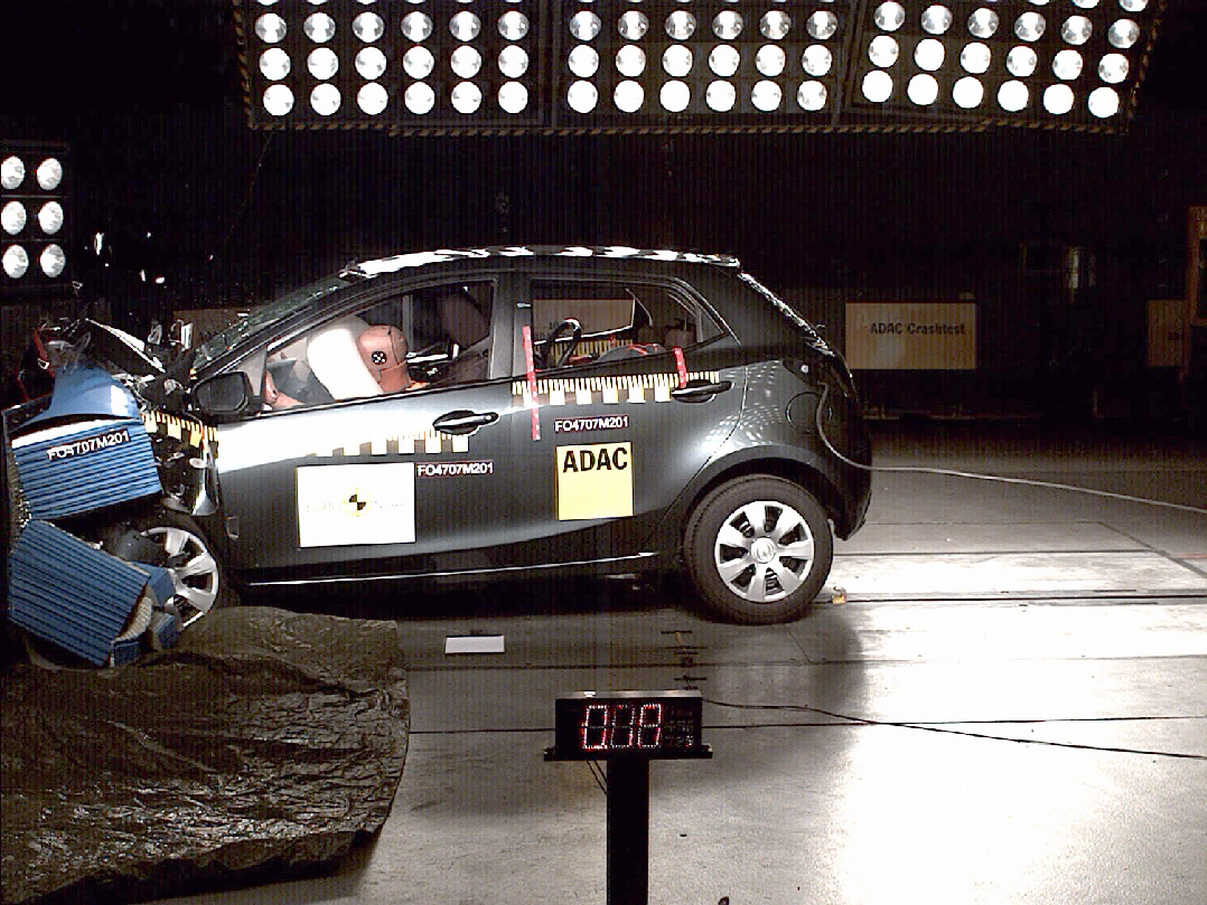
Today, EuroNCAP published the test results for the new Daihatsu Materia, the Honda Civic 5d and the Mazda 2. Starting with Mazda’s new supermini, which was granted a re-test due to a problem with the deployment of the front airbag, the “2” scored a maximum five stars for adult protection, fours stars for child protection and a mediocre two stars for pedestrian protection
As with the Civic Hybrid Sedan, the 5door Civic didn’t manage to achieve a maximum five stars rating for adult protection, managing a satisfactory 4-star rating. According to EuroNCAP, in the frontal test, the driver's airbag was not sufficiently well inflated to prevent the driver's head from contacting the steering wheel while structures in the dashboard presented a potential hazard to the driver's femurs. The Civic 5d was awarded four stars for child protection and just two stars for pedestrian protection.
Finally, the new Daihatsu Materia scored an adequate four star rating for adult protection, three star rating for child occupant safety and a mere two stars for pedestrian safety

MAZDA2
Front impact
In the first frontal test, a small disturbance shortly before impact resulted in late firing of the airbags and protection of the driver and passenger was compromised. Mazda investigated the problem and upgraded the airbag control software to handle such situations more effectively, as disturbances such as these can happen in real accidents. Production cars now have the new software and all cars manufactured before the change will be upgraded. In the re-test, the airbags fired as intended. The passenger compartment remained stable and the knees and femurs of the driver and passenger dummies were well protected. Mazda were able to demonstrate that the knees and femurs of occupants of different sizes and those sat in different seating positions would be similarly well protected.
Side impact
The rear door on the struck side opened during the test and the car was penalised one point.
Child-protection
The Mazda 2 scored maximum points for its protection of the three year old, based on the dummy reponses in the frontal and side impact tests. Mazda dealers can disable the passenger airbag, allowing a reaward facing child restraint to be used in that seating position. Without this modification, a rearward facing childseat should not be used in that seat as the airbag cannot be manually disabled. The label warning of the dangers of doing so was not adequate and was visible only when the passenger's sun visor was in the stowed position. The presence of ISOFIX anchorages in the rear outboard seats was not clearly marked.
Pedestrian protection
The bumper was rated as predominantly fair for its protection of pedestrians' legs. The part of the bonnet surface likely to be struck by adults' heads was rated as predominantly poor.

HONDA CIVIC
Front impact
Honda have modified the safety system of the Civic for the 2008 model year car. The timing of the pretensioners has been changed to provide better restraint of the front seat passengers and dual stage frontal airbags have replaced the previous single stage units. However, in the frontal test, the driver's airbag was not sufficiently well inflated to prevent the driver's head from contacting the steering wheel. The passenger compartment remained stable. Structures in the dashboard presented a potential hazard to the driver's femurs.
Side impact
The 2008 Civic has a larger side airbag than its 2006 predecessor. Rib deflections were lower, resulting in a score one point higher than the earlier version. Like last time, the car scored the maximum two points in the pole test.
Child-protection
The passenger airbag can be disabled by Honda dealers to allow a rearward facing child restraint to be used in that seating position. There was a clear warning of the dangers of using a childseat in that seat if the airbag has not been disabled. The presence of ISOFIX anchorages in the rear outboard seats was not clearly marked.
Pedestrian protection
Honda have made no changes that would influence the results of the pedestrian tests so the results of the car tested in 2006 have been carried over here. Both the bumper and the leading edge of the bonnet scored maximum points for the protection they offered to the legs of pedestrians. The part of the bonnet likely to be struck by a child's head was also rated predominantly 'fair'.

DAIHATSU MATERIA
Front impact
The driver dummy indicated considerable differential movement between the femur and the tibia. Such movement can lead to knee injuries. That result, combined with penalties for dashboard structures which could present further hazards to the driver, led to a 'weak' rating for protection of the knees, femurs and pelvis. The passenger compartment remained stable during the impact.
Side impact
A head protecting airbag is available as an option. As it is not standard equipment, the car was not eligible for a pole test.
Child-protection
The passenger airbag can be disabled to allow a rearward facing child restraint to be used in that seating position. However, information provided to the driver regarding the status of the airbag is not sufficiently clear. There was a clear warning of the dangers of using a rearward facing childseat in the position without having first disabled the airbag. The presence of ISOFIX anchorages in the rear outboard seats was not clearly marked.
Pedestrian protection
The bumper provided predominantly fair protection, as did the bonnet surface where an adult's head would strike. However, the front edge of the bonnet provided predominantly poor protection, as did that part of the surface where a child's head would contact.

No comments:
Post a Comment